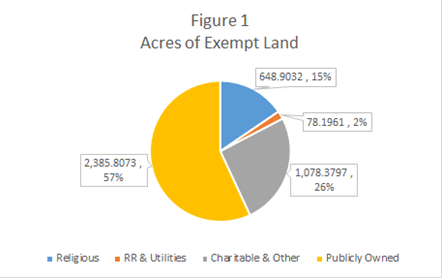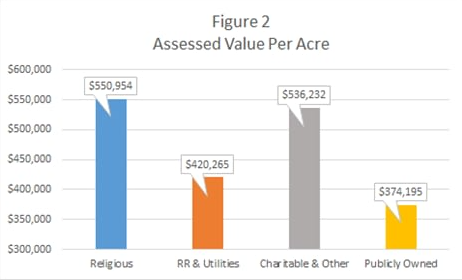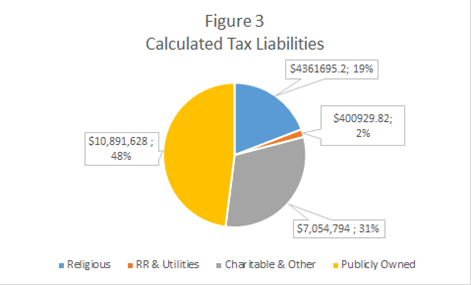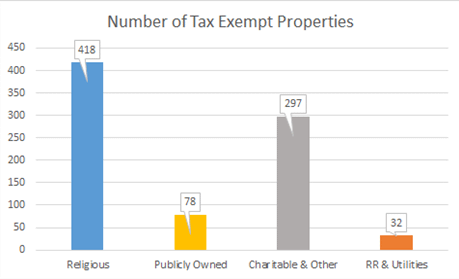“Statutorily exempt” is the term used to describe owners of land and buildings who, by virtue of their identities, are not required to pay property taxes. Their holdings are still assessed like everyone else’s but no bill is ever generated, despite the fact that they benefit from the same tax-funded amenities (like schools, roads, and public services) as everyone else. So while an organization’s tax exempt status may feel like a foregone conclusion, their savings aren’t actually free. As part of its commitment to transparency in taxation, CPTR explores the specific implications of tax exemptions for cities and towns across the country. This report is focused on the City of Roanoke, VA.
In the State of Virginia, statutorily exempt owners include religious institutions; federal, state, and city entities; public parks and libraries; charities; and more. Using the City’s 2021 tax data, it’s possible to understand exactly how this plays out in Roanoke.
Some 798 parcels are identified as tax exempt within the City limits. Together these properties constitute more than 4,268 acres valued at some $1.96 billion. Given the Roanoke’s tax rate of $1.22 per $100 of assessed value, that’s about $24 million in foregone tax revenue in 2020 alone. And for a city whose total property tax revenues equaled $95.8 million in the same year, that’s no small concession.

Who realizes these savings? As Figure 1 illustrates, publicly owned lands (i.e. those held by federal, state, regional, and city entities) constitute the lion’s share (about 2,400 acres or 57%) of the tax exempt land in Roanoke. Charitable and other organizations own the next largest slice of the pie (just over 1,000 acres or 26%), followed by religious organizations (~650 acres, 15%) and railroads and other utilities (78 acres, just 2%).
Not all acres are created equal, however, and as Figure 2 depicts, properties owned by religious organizations tend to be the most valuable (about $551K/acre), followed closely by those owned by “charitable and other” organizations. Railroad and utility-owned parcels are significantly less valuable (just over $420K/acre), and publicly-held properties have the lowest per acre average value (~$374K).
In addition to owning properties with the highest per acre value, religious organizations also own the largest number of tax exempt parcels in absolute terms (some 418 to be exact; see Figure 3). All told, at almost $360M in total assessed value, religious organizations saved about $4.4M in property taxes in 2021 thanks to their statutorily exempt status. Charities and other organizations own 297 properties, the second highest count of exempt parcels in Roanoke. Publicly-owned and railroad and utility-owned parcels number fewer than 100 each (78 for the former, 32 for the latter).

Who realizes these savings? As Figure 1 illustrates, publicly owned lands (i.e. those held by federal, state, regional, and city entities) constitute the lion’s share (about 2,400 acres or 57%) of the tax exempt land in Roanoke. Charitable and other organizations own the next largest slice of the pie (just over 1,000 acres or 26%), followed by religious organizations (~650 acres, 15%) and railroads and other utilities (78 acres, just 2%).
Not all acres are created equal, however, and as Figure 2 depicts, properties owned by religious organizations tend to be the most valuable (about $551K/acre), followed closely by those owned by “charitable and other” organizations. Railroad and utility-owned parcels are significantly less valuable (just over $420K/acre), and publicly-held properties have the lowest per acre average value (~$374K).
In addition to owning properties with the highest per acre value, religious organizations also own the largest number of tax exempt parcels in absolute terms (some 418 to be exact; see Figure 3). All told, at almost $360M in total assessed value, religious organizations saved about $4.4M in property taxes in 2021 thanks to their statutorily exempt status. Charities and other organizations own 297 properties, the second highest count of exempt parcels in Roanoke. Publicly-owned and railroad and utility-owned parcels number fewer than 100 each (78 for the former, 32 for the latter).

Publicly owned lands, though smaller in number, account for almost half (48%) of the foregone tax revenue from Roanoke’s statutorily exempt properties (see Figure 3). The single most valuable tax exempt property, for example, is a City-owned parcel larger than 540 acres and valued at just under $400M. Carilion-Roanoke Hospital’s South Wing (valued at nearly $228M) and a Western Virginia Water Authority property (worth almost $130M) round out the top three most valuable tax exempt properties in the City.
So what do we do with this new found knowledge of tax exemptions in Roanoke, VA? The answer is, perhaps frustratingly, not much. It’s highly unlikely that Virginia, or any State for that matter, will begin charging its statutorily exempt owners property taxes. But just for fun, let’s consider the effect on the average residential property owner if they did.
Roanoke is a city of just under 100,000 people, and the tax rolls include a little more than 32,000 residential parcels, each paying, on average, about $1,700 in property taxes every year. Omitting all publicly owned properties (because taxing them to pay for public services makes no sense), bringing the City’s statutorily exempt parcels onto the tax rolls would allow Roanoke could lower its millage rate by about 11% and still bring in the $95.8M in property tax revenue it was projecting for the year. The result would be a reduction in the average annual residential property tax bill to about $1,500.

Every city and town has its share of statutorily exempt parcels. In Roanoke, those properties constitute a large share of the City’s total property value, leaving residents and other non-exempt owners to shoulder the financial responsibilities for the public services and amenities on which everyone relies.

